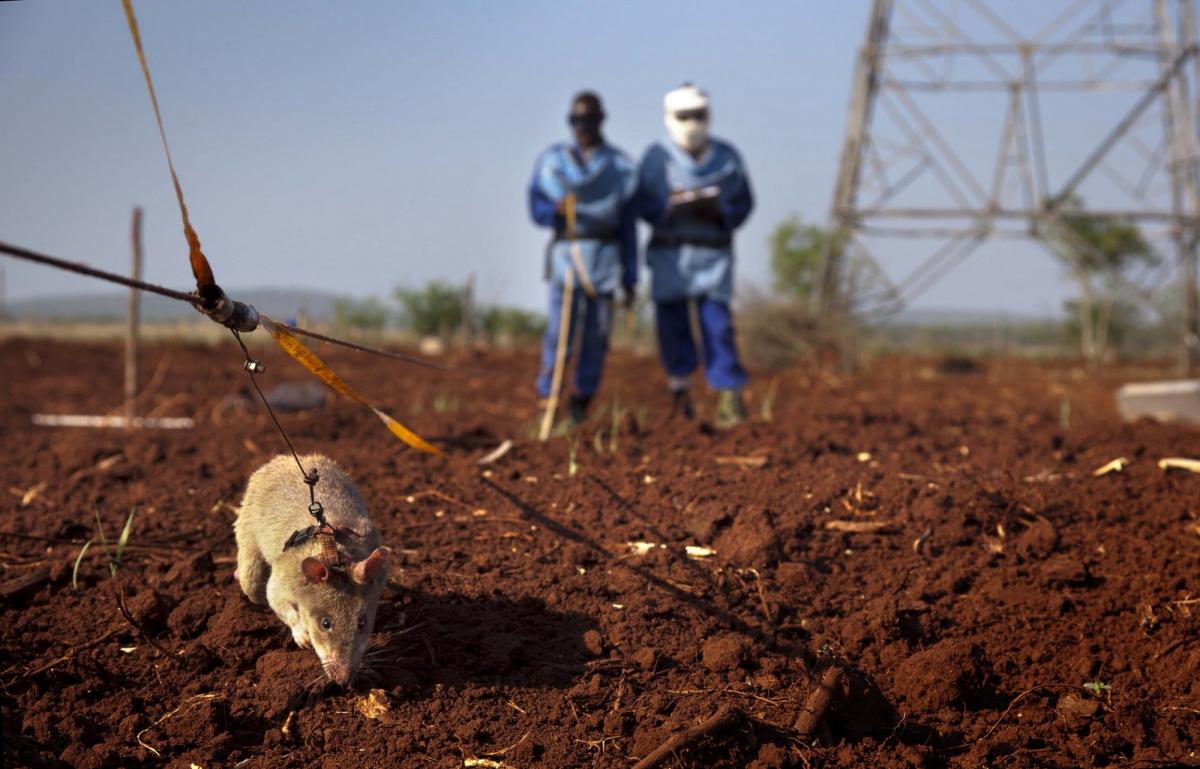-
Last updated on

© APOPO
Single grandmother Gloria Tiki has been living in fear for over 20 years as her land is situated close to an electricity line. During the Mozambican Civil War (1977-1992), landmines were placed under the masts and cables. ‘My 3 daughters can hardly remember that it was once safe to play there’, she says. ‘My grandchildren never knew those days and I can assure you: working the land while a mine can explode at any moment, that's terrible! But we had no choice. The land was my only source of income and food.’
Until early 2013, when APOPO carried out demining operations. ‘They first spoke with our chief to identify the risk areas, and then came up with machinery, metal detectors and even rats! We were very surprised by this method.’ Rats are considered as a plague in Africa because they eat crops and food supplies. Few people realise that these wretched rodents can be so useful.’

Gloria Tiki (right) with her daughter in her field. © APOPO
The rats already did an excellent job on Gloria's land. ‘They even found mines many meters away from the masts, next to old bombs and bullets.’ It is nothing short of a miracle that Gloria and her children never stepped on a mine. Others in her community were less fortunate, there was also one fatal accident. But since 2013, Gloria has been able to work her land without any worries, even close to the masts. ‘The land is fertile because it has not been used for so long.’
African giant pouched rats
Where does the idea of using rats to detect mines come from? Belgian Bart Weetjens not only had rats as pets in 1995, he also looked for a solution to those horrible explosive remnants of war. When he read that desert rats have a highly developed sense of smell, he got an idea. Could rats smell landmines? Prof. Ron Verhagen (UAntwerp) advised him to test the ‘African giant pouched rat’, which is found throughout most of Sub-Saharan Africa.
And that's how Weetjens got to work. In the early days, he received support from the Belgian Development Cooperation, among others. The rats had to learn how to detect TNT, the explosive substance found in landmines. In addition, they had to be able to distinguish it from scrap metal. This immediately gave him an important advantage over traditional demining, which uses metal detectors that detect every piece of metal, making it very time-consuming.

Bart Weetjens looks on while a Tanzanian trainer gives treats to a rat. © APOPO
Click sound
By trial and error - the rats had to be trained - Weetjens’ team managed to work out a proper training procedure. Basically, the rats learn that they get a treat after hearing a click. And they only hear that click sound when they find TNT. The training was successful and the first so-called 'HeroRATs' received their 'diploma'. Today, the training and research centre for rats is located in Tanzania. By the way, from the very beginning, APOPO worked closely with the Tanzanian Sokoine University of Agriculture.

A rat first learns to recognize the smell of TNT in a tea infuser. © APOPO
The trained rats act extremely quickly. A single HeroRAT can sniff an area the size of a tennis court in 30 minutes. This would take a deminer with a metal detector up to 4 days, depending on the levels of scrap metal present. Rats are also safer and more effective. With classic demining, 1 deminer is killed and 2 are injured for every 5,000 successfully-removed mines.
Living without stress
In addition to highly developed sense of smell and their speed, the African giant pouched rats have many more advantages. They are very intelligent and quiet and can be trained easily. With their 1 kg, they are too light to set off a mine. Because they are indigenous to Africa, they are perfectly adapted to the environment. They also adapt quickly when a new trainer takes them over.
It is also cheap to keep the rats and APOPO does this with great care. ‘The cages are spacious and well-ventilated,’ explains training manager Pendo Msegu. ‘Each cage has a clay pot resembling their natural underground nest. The rats can also gnaw on a wooden tripod. Every day they spend time in large shaded play enclosures with climbing branches and ropes and hiding places. It helps to prevent boredom, stress and aggression.’ And the approach pays off: the HeroRATs enjoy a long life.
220 employees
Meanwhile, APOPO has grown into an organisation with 220 employees, present in 7 countries. The annual turnover is approximately 4 million euros. Since its creation, no less than 108,000 mines have been cleared and more than 24 million m² of land have been returned to almost 1 million people. APOPO is involved in demining operations in countries such as Angola, Cambodia, Zimbabwe and Ethiopia.
The need remains high. An estimated 110 million mines are still in the ground. Mines kill or injure 5,000 people every year. Yet, founder Bart Weetjens has hope. ‘If we continue our work, the world's landmine problem will be completely solved within 20 to 30 years.’
Elephants, pangolins and African hardwood
APOPO is also committed to the environment. For example, the Zimbabwean government asked for the Great Limpopo Transfrontier Park to be demined. This is the world's largest nature reserve that spans 3 countries: Zimbabwe, Mozambique and South Africa. The 35,000 km² area has enormous potential for both nature and ecotourism. Unfortunately, a strip of more than 7 million m² is dotted with landmines. Elephants are among the victims.
The African giant pouched rats can of course smell more than just TNT. For example, APOPO is currently training them to recognise the pangolin and African hardwood. One is the most poached mammal in the world, the other is an illegally logged and traded wood species. The trained rats will assist customs officers.

A rat sniffs samples searching for tuberculosis. © APOPO
Tuberculosis
Tuberculosis control (TB) is another major project of APOPO. No matter how 'old-fashioned' the disease sounds to us, it has not left the world behind. Every year, about 10 million people are infected with TB and 1.6 million die from it. Detection is not easy, and certainly not in laboratories that are not optimally equipped. In most countries of Sub-Saharan Africa, only half of the TB patients are diagnosed.
Thanks to the HeroRATs, more than 100 public hospitals in Tanzania, Ethiopia and Mozambique saw their TB detection rate increase by 40%. So far, 250,000 samples have been retested with trained rats. More than 14,700 patients who initially tested negative for TB were correctly diagnosed thanks to the HeroRATs. The rats can sniff 100 samples in 20 minutes. A lab technician would need up to 4 days to treat the same number of samples.
Tracking dogs
APOPO also continues to innovate. They have trained a number of dogs to detect TNT. These tracking dogs allow the detection of mines in areas with heavy vegetation. For HeroRATs it is necessary to eliminate the vegetation, which can be an expensive and time-consuming process. The tracking dogs carry a microphone so that the guide can give orders.
APOPO has been demonstrating for more than 20 years that animals can do very useful work. And all this without losing sight of animal welfare. Vulnerable people in poor communities in particular saw their quality of life improve considerably.
The Belgian Development Cooperation supported APOPO during its early days. Today, the organisation receives support from many sponsors, including the Flemish Community.
More on Peace & security

10 facts about migration you did not know yet
Although migration is high on the agenda nowadays, a great deal of uncertainty remains. Find out more about this important topic...

Drones to ensure safer demining
Through Handicap International, Belgium has invested 1.48 million euros in Chad to deploy drones for mine clearance operations a...
How does the international community deal with conflicts?
In February 2017, Belgium organised a high-level congress on mediation. Belgian expert Jonas Claes was one of the speakers. He t...
